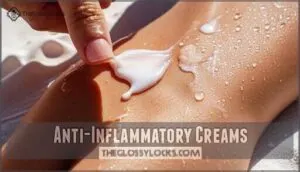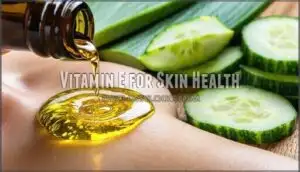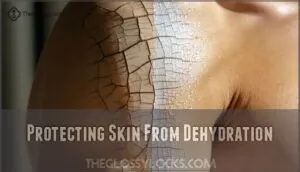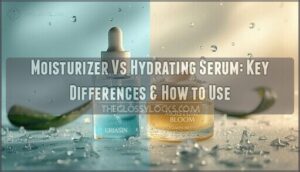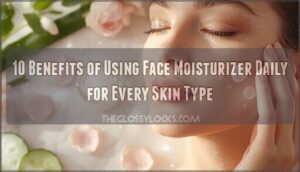This site is supported by our readers. We may earn a commission, at no cost to you, if you purchase through links.
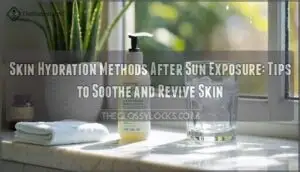
Apply moisturizer immediately afterward when skin is still damp to lock in hydration. Look for products containing hyaluronic acid, ceramides, or aloe vera – these ingredients work like little drink stations for your skin cells.
Don’t forget to sip water throughout the day; skin hydration methods after sun exposure work from both inside and out. A cold compress can also provide relief for especially hot areas.
The right aftercare routine doesn’t just soothe today’s sunburn – it prevents tomorrow’s skin damage.
Table Of Contents
- Key Takeaways
- Hydrating Sun Damaged Skin
- Soothing Sunburned Skin
- Natural Remedies for Hydration
- Protecting Skin From Dehydration
- Long Term Skin Hydration Methods
- Frequently Asked Questions (FAQs)
- How to rehydrate skin after sun exposure?
- What is the best thing to put on your skin after sun exposure?
- How to rehydrate after being in the sun?
- How do I get my skin back to normal after being in the sun?
- Can skin condition affect hydration retention?
- Is nighttime hydration different from daytime?
- How often should hydrating face masks be applied?
- Do oral hydration supplements benefit skin?
- Can over-hydrating damage sun-exposed skin?
- Conclusion
Key Takeaways
- After sun exposure, take a cool shower and apply moisturizer while your skin is still damp to lock in hydration, focusing on products with hyaluronic acid, ceramides, or aloe vera.
- Don’t underestimate the importance of internal hydration—drink plenty of water throughout the day and consider electrolyte-enhanced drinks to support cellular repair from within.
- Apply cold compresses for 15-20 minutes each hour to reduce inflammation, and use anti-inflammatory ingredients like aloe vera gel (which you can store in the refrigerator for extra cooling relief).
- Establish a long-term hydration routine that includes consistent moisturizing, gentle exfoliation 2-3 times weekly, daily sunscreen application, and consuming nutrient-rich foods to support skin health.
Hydrating Sun Damaged Skin
When your skin feels parched and tight after a day in the sun, rehydrating it becomes essential to prevent long-term damage.
Using ingredients like hyaluronic acid and ceramides helps restore moisture, repair the skin barrier, and leave your skin feeling healthy again.
Importance of Moisturizing
Moisturizing is essential after sun exposure to restore skin hydration and maintain its barrier function.
Here’s a short, engaging blockquote that matches the tone of the content:
Think of moisturizing as rescuing your skin’s protective shield after the sun has tried to break it down.
It helps with moisture retention, preventing peeling and reducing inflammation.
Think of it as giving your skin a rejuvenating drink after a long, hot day.
A refreshing drink for your skin, restoring hydration and vitality after soaking up the sun.
Regularly moisturize skin to improve elasticity and avoid skin dehydration, keeping it smooth, healthy, and comfortable.
Consistent moisturizing can also help in reversing sun damage to achieve healthy skin.
Benefits of Hyaluronic Acid
Hyaluronic acid (HA) is your skin’s hydration superhero after sun exposure.
It boosts HA production, helping to:
- Moisturize skin deeply, preventing dryness.
- Enhance skin elasticity, reducing wrinkles.
- Support wound healing for sunburn relief.
- Plump skin, smoothing fine lines.
With its ability to lock in moisture, HA hydration guarantees your after-sun care routine leaves skin refreshed and rejuvenated.
Role of Ceramides in Skin Hydration
Ceramides are your skin’s secret weapon for moisture retention and barrier repair.
They’re lipids that restore the skin’s natural shield, locking in hydration and keeping irritants out.
After sun exposure, ceramides in moisturizers boost skin health by replenishing its lipid composition, aiding sunburn relief.
They’re essential lipids that help maintain skin barrier integrity.
These skin hydration methods are essential for effective after-sun care to hydrate skin deeply.
Niacinamide for Skin Repair
Niacinamide is a multitasker for skin repair, especially after sun exposure.
It hydrates skin, reduces redness, and strengthens the barrier to lock in moisture. Plus, it offers anti-aging effects by boosting collagen.
Try it daily to see these benefits:
- Reduces redness for sunburn relief.
- Improves barrier function for hydration.
- Controls oil for balanced skin.
- Fights aging with smoother texture.
Soothing Sunburned Skin
You’ll need to act quickly when sunburn strikes, as cooling and soothing your skin within the first few hours can substantially reduce inflammation and prevent further damage.
After sun exposure, your skin craves gentle care and proper hydration to repair itself.
Making targeted treatments with aloe vera, cold compresses, and anti-inflammatory creams essential components of effective sunburn recovery.
Cool Shower Therapy
After sun exposure, a cool shower works wonders for sunburn relief and skin hydration.
Here’s a short, engaging blockquote about skin hydration after sun exposure in the same tone as the content:
A cool shower after sun exposure is like hitting the reset button for your parched, overheated skin.
Keep the shower temperature lukewarm to cool—never cold—to avoid shocking sensitive skin.
Limit shower duration to 5-10 minutes, skip harsh soaps, and opt for gentle cleansers.
Pat yourself dry with a soft towel instead of rubbing, preserving moisture and leaving your skin feeling soothed and refreshed.
Aloe Vera Gel Benefits
After cooling your skin with a shower, reach for pure aloe vera gel – nature’s sunburn first aid kit.
The clear gel contains enzymes that reduce inflammation and accelerate healing. For best results, apply a thin layer to affected areas several times daily.
Consider exploring aloe products for various skin applications.
Store your aloe in the refrigerator for extra cooling relief. Most people tolerate aloe well, but do a patch test if you have sensitive skin to ensure you can use aloe without any issues.
Anti-Inflammatory Creams
Two powerful compounds, lico-chalcone A and glycyrrhetinic acid, can come to your rescue when dealing with sun-inflamed skin.
These anti-inflammatory ingredients effectively reduce redness and soothe irritation.
For best results, apply hydrocortisone creams gently to affected areas using clean fingertips.
While cortisone cream offers quick inflammation relief, alternative options containing blue tansy or jasmine provide similar benefits with fewer potential side effects.
Consider Licochalcone A cream options for soothing relief.
Cold Compresses for Relief
Frequently, cold compresses offer immediate relief for sunburned skin. You’ll want to wrap ice cubes in a soft cloth—never apply ice directly to your skin.
For best results, apply your compress for 15-20 minutes every hour as needed. Don’t have ice? Wet a washcloth with cool water instead.
These simple compresses reduce inflammation, soothe irritation, and provide much-needed comfort when your skin feels like it’s on fire.
For enhanced relief, consider that aloe vera is soothing to sunburned skin, which can offer immediate relief and is a great way to calm sunburned skin.
Natural Remedies for Hydration
You’ll find relief for sun-damaged skin in your kitchen with natural remedies that effectively restore moisture and calm inflammation.
Mother Nature offers powerful hydrating ingredients like aloe vera, cucumber extract, vitamin E, and omega fatty acids that work together to soothe your parched skin cells and support your skin’s natural healing process.
Aloe Vera Extract
Almost every skincare enthusiast knows that pure aloe vera extract is nature’s gift for post-sun skin hydration.
When applied directly to sunburned areas, this clear gel delivers immediate cooling relief while replenishing lost moisture.
You’ll find aloe vera in various forms—from fresh plant cuttings to sustainably sourced commercial extracts.
While side effects are rare, always perform a patch test before widespread application to verify your skin responds positively to this soothing, hydrating remedy.
Cucumber Extract Benefits
Harnessing cucumber extract’s cooling properties offers significant benefits for sun-damaged skin.
You’ll appreciate how this natural hydration source instantly soothes sunburn while reducing skin inflammation.
Rich in antioxidant benefits, cucumber extract helps fight free radicals caused by UV exposure.
Its high water content delivers deep skin rejuvenation, making it perfect for skin hydration methods after too much sun.
Think of it as nature’s air conditioning for your overheated skin, providing a natural solution with high water content.
Vitamin E for Skin Health
While cucumber extract cools your skin, Vitamin E works as a powerful antioxidant to repair sun damage.
This nutrient fights free radicals that harm your skin cells after UV exposure. You’ll find Vitamin E in many after-sun products, but you can also apply it directly as an oil.
To further enhance the benefits, consider that tocopherols are included in Vitamin E compounds. For best results, use products combining Vitamin E with other skin antioxidants.
Regular topical application helps with scar reduction and maintains overall skin health, making Vitamin E a valuable component of a skincare routine with its antioxidant properties.
Omega Fatty Acids for Nourishment
Your skin craves omega fatty acids after sun exposure.
These powerful nutrients rebuild your skin barrier and reduce inflammation while promoting cellular repair.
Omega-3s from salmon, walnuts, and flaxseeds are particularly effective for sun exposure recovery.
They work from within to hydrate and restore damaged skin cells.
For best results, combine dietary sources with topical omega-rich skin nourishing treatments to maximize hydration benefits.
Protecting Skin From Dehydration
You’ll need to protect your skin from dehydration after sun exposure, as UV rays can drain moisture from your skin cells faster than you can say "sunburn."
Keeping your body hydrated both internally with plenty of water and externally with the right moisturizers will help repair sun damage while preventing the tight, uncomfortable feeling that comes with dried-out skin, which is crucial for maintaining healthy and hydrated skin cells.
Drinking Water for Hydration
Your body’s hydration directly impacts your skin’s resilience after sun exposure.
Water intake supports cellular hydration, helping restore skin elasticity and flush out toxins.
When you’re dehydrated, your skin suffers first, becoming tight and sensitive.
Try drinking 8-10 glasses daily, especially after sun exposure.
For maximum benefit, sip water consistently throughout the day rather than consuming large amounts at once, to support cellular hydration and maintain skin elasticity, and help your body flush out toxins.
Electrolyte Water Benefits
Drinking electrolyte water after sun exposure does more than quench your thirst—it actively repairs sun-damaged skin from within.
When you’re sunburned, your body needs mineral replenishment to support cellular function and sunburn recovery.
Your skin cells crave these minerals for faster healing
- Electrolytes improve hydration at the cellular level
- Sports drinks contain what your parched skin needs most
- The right fluids can reduce peeling and redness
Beyond regular water, electrolyte-enhanced drinks provide the hydration boost needed for effective post-sun exposure care.
Combatting dry air with humidifier usage can further enhance skin hydration.
Avoiding Dehydrating Foods
While electrolyte water helps restore balance, what you avoid matters just as much.
Cut back on alcohol, caffeine, and high-sodium foods after sun exposure – they’re notorious for pulling moisture from your body.
Skip sugary drinks and minimize processed snacks that contribute to internal dehydration.
Your skin’s hydration works from the inside out, so smart food choices directly impact how quickly your sun-damaged skin recovers its moisture balance.
Staying Hydrated in Hot Weather
In summer’s scorching embrace, your hydration timing becomes essential for skin health.
You’ll need to drink water consistently throughout the day, not just when thirsty, as thirst mechanisms lag behind actual fluid needs.
Carry a reusable water bottle and set hourly reminders.
Combine electrolyte balance with cooling strategies like consuming cucumber-infused water to maintain skin moisture and prevent heatstroke, especially during peak sun exposure.
Long Term Skin Hydration Methods
You’ll need consistent habits to maintain your skin’s moisture balance long after sun exposure has faded.
A well-planned routine of daily moisturizing, gentle exfoliation, proper sun protection, and nutrient-rich foods can transform your skin from sun-damaged to naturally hydrated.
Daily Moisturizing Routine
Establishing a consistent daily moisturizing routine is your skin’s best defense against sun damage.
Start with Routine Skin Prep by cleansing with a gentle, hydrating cleanser. Follow with Product Layering—apply serums before moisturizers for maximum absorption.
Don’t forget Nighttime Moisturizing when skin repairs itself.
For Year-Round Hydration, adjust your products seasonally, using lighter formulations in summer and richer creams in winter. The right Ingredient Synergy between hyaluronic acid and ceramides keeps your skin plump and protected.
Exfoliating for Skin Renewal
Three key exfoliation methods can revive sun-damaged skin by promoting cell turnover.
Chemical peels with AHAs or BHAs gently dissolve dead cells, while manual exfoliation physically removes buildup.
For sensitive post-sun skin, try enzyme exfoliation with fruit extracts.
Exfoliate just 2-3 times weekly to avoid irritation—think of it as clearing away the old to make room for the new.
Always follow with hydration for best skin renewal benefits.
Sunscreen for Preventing Dryness
The right sunscreen doesn’t just prevent burns—it actually helps maintain skin hydration after sun exposure.
Think of it as your skin’s personal umbrella against moisture loss.
Here’s how sunscreen supports hydrated skin:
- Broad-spectrum formulas with hydrating SPF ingredients create a protective barrier that locks moisture in
- Water-resistant sunscreens maintain skin hydration during sweaty activities
- Frequent application (every two hours) guarantees continuous protection from drying UV damage.
Many find that sunscreen boosts hydration is a key factor in maintaining healthy skin.
Nutrient Rich Foods for Skin Health
What you eat can work from within to heal sun-damaged skin.
Your body needs specific nutrients to repair and hydrate depleted skin cells.
| Nutrient Group | Food Sources | Skin Benefits | Daily Recommendation |
|---|---|---|---|
| Antioxidant Power | Berries, dark chocolate | Fights free radical damage | 1-2 servings |
| Omega Benefits | Fatty fish, walnuts | Reduces inflammation | 2-3 servings weekly |
| Vitamin Intake | Citrus, leafy greens | Boosts collagen production | 3+ servings daily |
| Mineral Support | Nuts, seeds | Enhances cellular repair | 1 handful daily |
The table outlines the key nutrient groups, including Antioxidant Power, Omega Benefits, Vitamin Intake, and Mineral Support, which are essential for maintaining healthy skin.
Frequently Asked Questions (FAQs)
How to rehydrate skin after sun exposure?
An ounce of prevention is worth a pound of cure.
After sun exposure, take a cool shower, apply aloe vera gel, use a ceramide-rich moisturizer.
Drink plenty of water, and avoid hot water to restore hydration.
What is the best thing to put on your skin after sun exposure?
After sun exposure, apply cooling aloe vera gel to soothe inflammation, followed by a hydrating moisturizer with ceramides and hyaluronic acid.
Don’t forget to drink plenty of water to rehydrate your skin from within.
How to rehydrate after being in the sun?
Like a parched garden after a heatwave, your skin needs revitalization.
Drink plenty of water, apply aloe vera gel, and use moisturizers with hyaluronic acid, ceramides and antioxidants to replenish lost moisture.
How do I get my skin back to normal after being in the sun?
Take a cool shower, apply aloe vera gel, and drink plenty of water.
Moisturize with products containing ceramides and hyaluronic acid.
Avoid further sun exposure and use sunscreen when heading outdoors.
Can skin condition affect hydration retention?
Studies show 90% of skin conditions impact moisture retention. Yes, your skin condition directly affects hydration retention. Damaged barriers can’t lock in moisture effectively, while healthy skin maintains ideal hydration levels.
Is nighttime hydration different from daytime?
Yes, nighttime hydration differs from daytime.
Your skin naturally repairs itself while you sleep, making evening the perfect time for heavier, more nourishing moisturizers without worrying about sun protection or makeup interference.
This allows for uninterrupted skin repair and nourishing benefits.
How often should hydrating face masks be applied?
Apply hydrating face masks 1-2 times weekly for normal skin, 2-3 times for sun-damaged skin.
You’ll need more frequent application after significant sun exposure, but don’t overdo it—your skin needs recovery time between treatments.
Do oral hydration supplements benefit skin?
Your skin’s hydration level can drop by 20% after sun exposure.
You’ll get better results from oral hydration supplements with electrolytes and collagen, which work from within to restore moisture and improve elasticity.
Can over-hydrating damage sun-exposed skin?
While rare, excessive water application won’t harm sun-exposed skin.
You’re more likely to dilute protective oils with too much washing.
Stick to gentle cleansing and moderate moisturizing for ideal healing after sun exposure.
Conclusion
Embracing these skin hydration methods after sun exposure protects your largest organ now and for years to come.
Whether you’re applying aloe vera to sunburned shoulders or drinking electrolyte water while relaxing indoors, each step matters.
Remember, consistency is key—a daily hydration routine helps repair damage and builds resilience against future sun stress.
Your skin works hard protecting you; return the favor by giving it the moisture it craves after basking in those sunny rays.




